Applying Psychological Theories in Health and Social Care Practices
VerifiedAdded on 2021/02/20
|13
|2540
|36
Report
AI Summary
This report examines the application of psychological perspectives in health and social care, focusing on the theories of Erikson and Piaget. It reflects on the importance of understanding child development, especially during infancy, and how these theories can enhance healthcare practices. The report emphasizes the significance of trust and cognitive development, highlighting the role of healthcare professionals in providing a safe and supportive environment for children and their families. It discusses how to apply these principles as part of a duty of care, including educating parents and carers, recognizing and addressing potential issues, and promoting overall well-being. The report also relates these learnings to social and care practices, underscoring the need for family-based care and the importance of healthcare professionals' communication and empathy. By understanding the stages of child development and applying these psychological perspectives, healthcare providers can improve patient outcomes and create a more supportive and effective care environment.
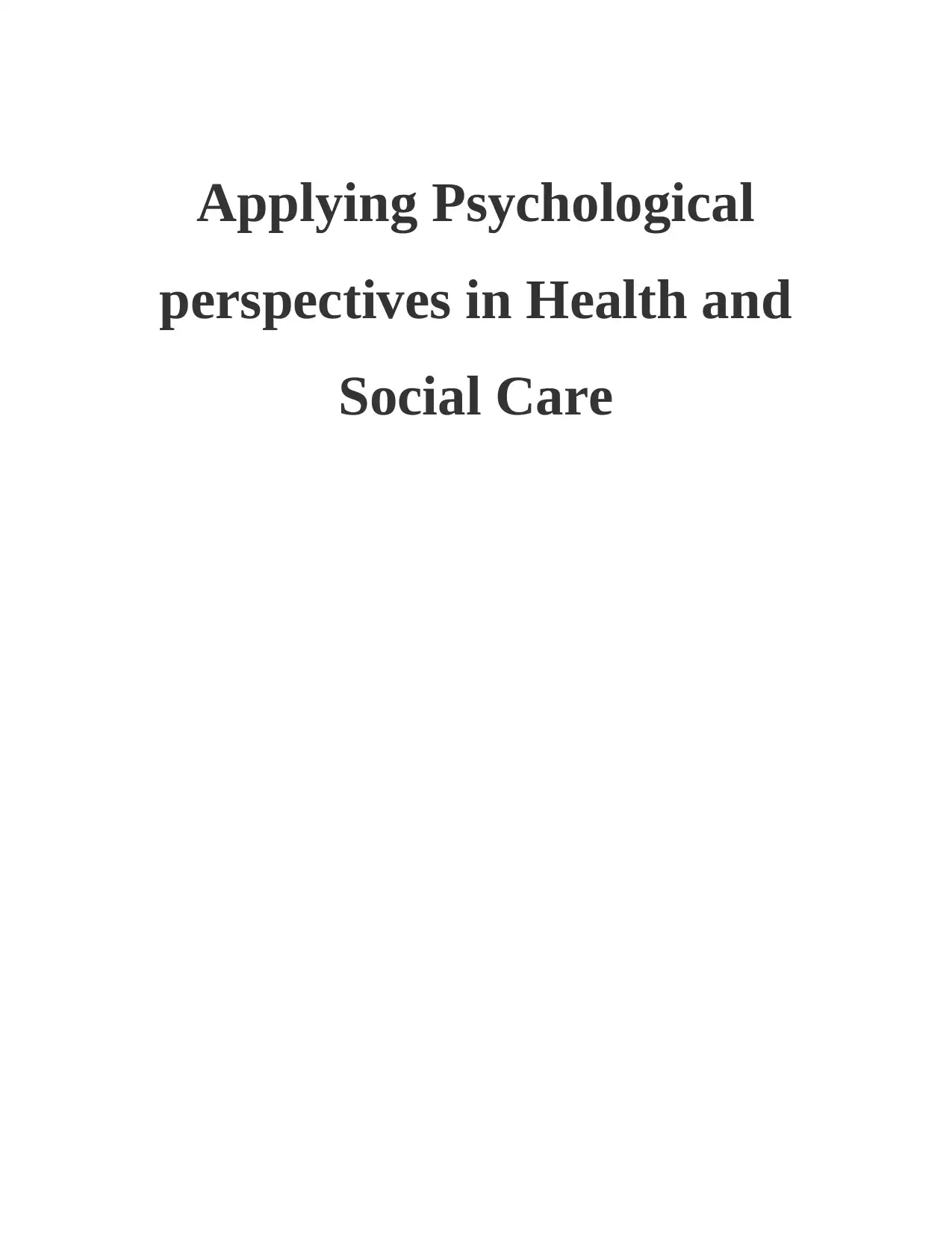
Applying Psychological
perspectives in Health and
Social Care
perspectives in Health and
Social Care
Paraphrase This Document
Need a fresh take? Get an instant paraphrase of this document with our AI Paraphraser
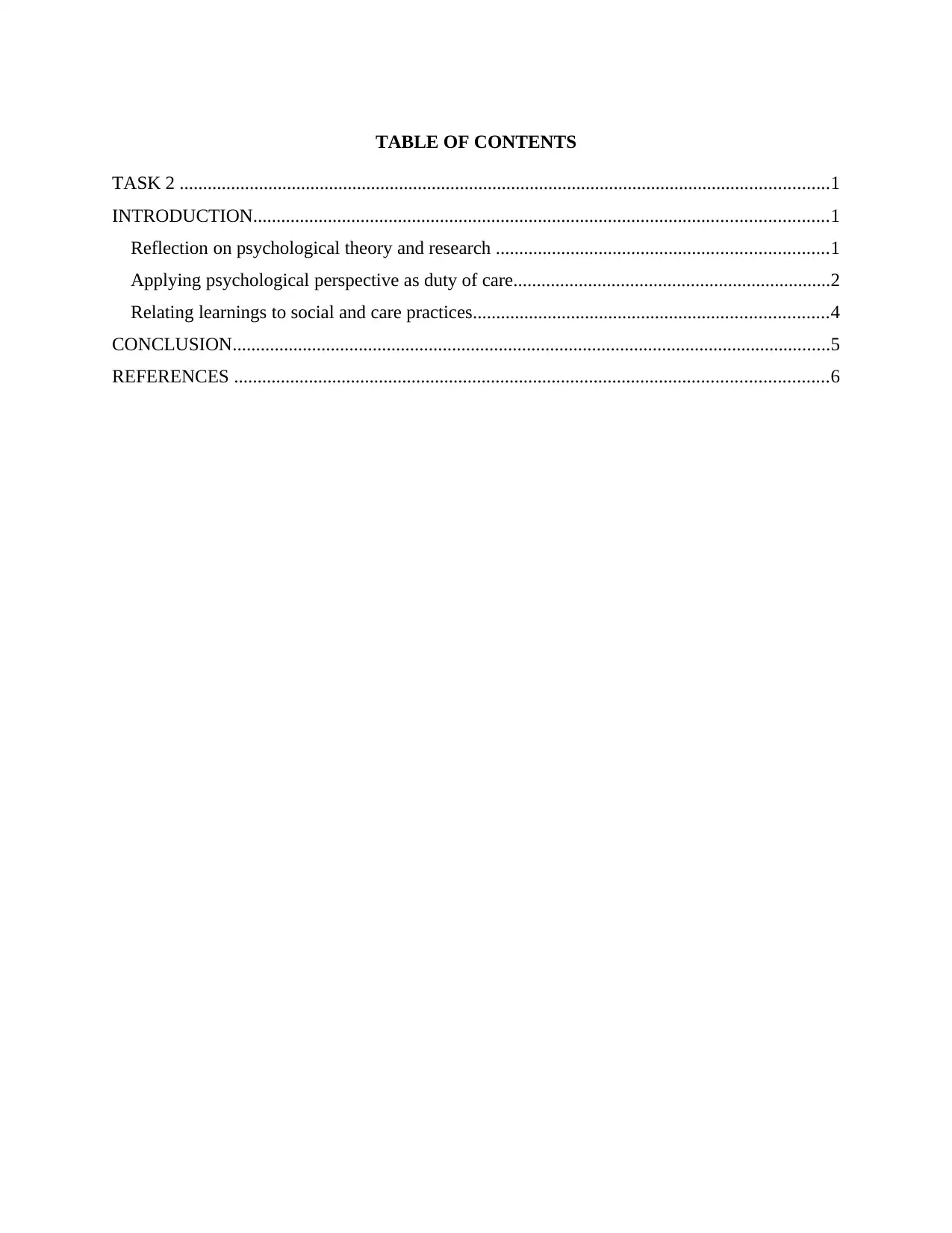
TABLE OF CONTENTS
TASK 2 ...........................................................................................................................................1
INTRODUCTION...........................................................................................................................1
Reflection on psychological theory and research .......................................................................1
Applying psychological perspective as duty of care....................................................................2
Relating learnings to social and care practices............................................................................4
CONCLUSION................................................................................................................................5
REFERENCES ...............................................................................................................................6
TASK 2 ...........................................................................................................................................1
INTRODUCTION...........................................................................................................................1
Reflection on psychological theory and research .......................................................................1
Applying psychological perspective as duty of care....................................................................2
Relating learnings to social and care practices............................................................................4
CONCLUSION................................................................................................................................5
REFERENCES ...............................................................................................................................6
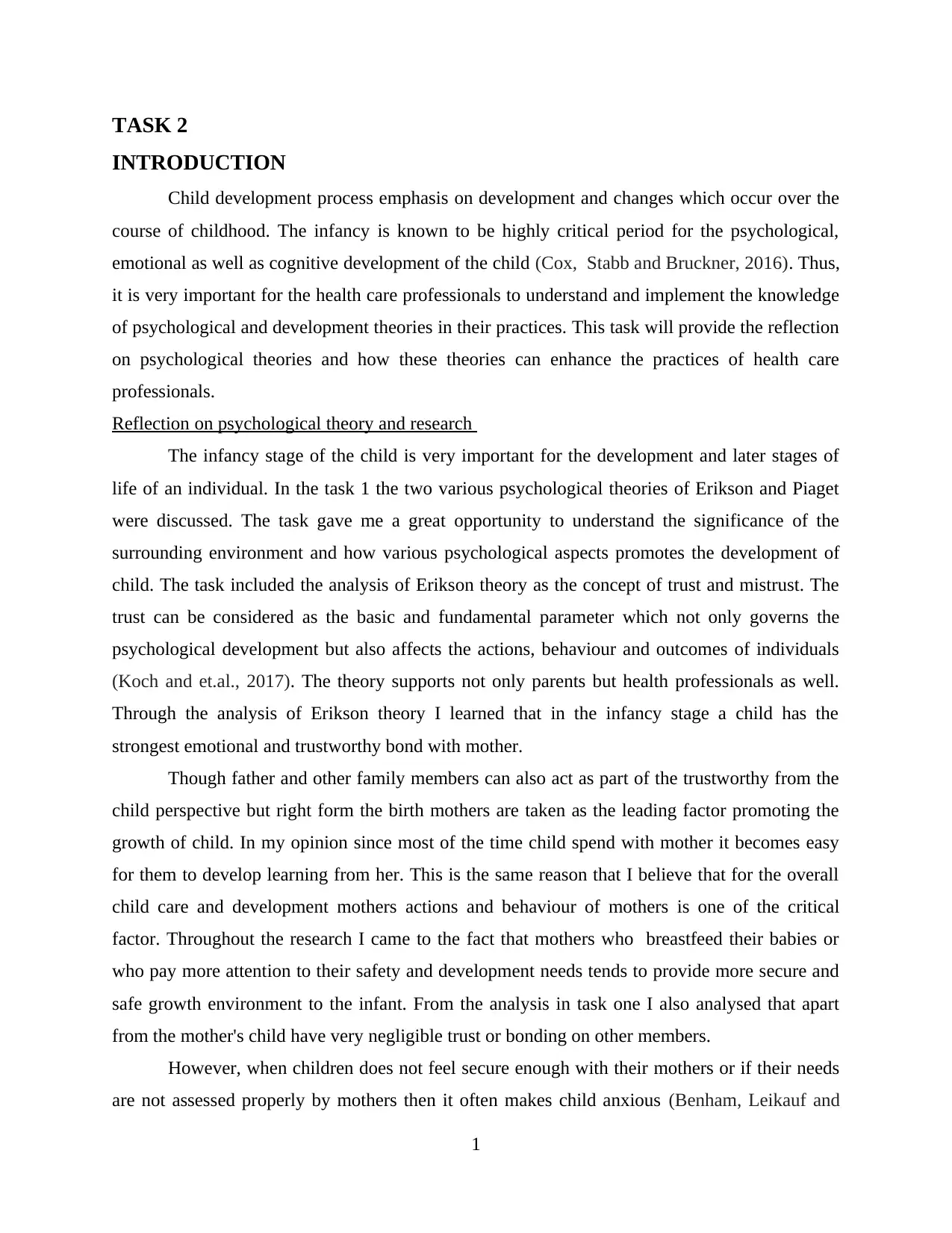
TASK 2
INTRODUCTION
Child development process emphasis on development and changes which occur over the
course of childhood. The infancy is known to be highly critical period for the psychological,
emotional as well as cognitive development of the child (Cox, Stabb and Bruckner, 2016). Thus,
it is very important for the health care professionals to understand and implement the knowledge
of psychological and development theories in their practices. This task will provide the reflection
on psychological theories and how these theories can enhance the practices of health care
professionals.
Reflection on psychological theory and research
The infancy stage of the child is very important for the development and later stages of
life of an individual. In the task 1 the two various psychological theories of Erikson and Piaget
were discussed. The task gave me a great opportunity to understand the significance of the
surrounding environment and how various psychological aspects promotes the development of
child. The task included the analysis of Erikson theory as the concept of trust and mistrust. The
trust can be considered as the basic and fundamental parameter which not only governs the
psychological development but also affects the actions, behaviour and outcomes of individuals
(Koch and et.al., 2017). The theory supports not only parents but health professionals as well.
Through the analysis of Erikson theory I learned that in the infancy stage a child has the
strongest emotional and trustworthy bond with mother.
Though father and other family members can also act as part of the trustworthy from the
child perspective but right form the birth mothers are taken as the leading factor promoting the
growth of child. In my opinion since most of the time child spend with mother it becomes easy
for them to develop learning from her. This is the same reason that I believe that for the overall
child care and development mothers actions and behaviour of mothers is one of the critical
factor. Throughout the research I came to the fact that mothers who breastfeed their babies or
who pay more attention to their safety and development needs tends to provide more secure and
safe growth environment to the infant. From the analysis in task one I also analysed that apart
from the mother's child have very negligible trust or bonding on other members.
However, when children does not feel secure enough with their mothers or if their needs
are not assessed properly by mothers then it often makes child anxious (Benham, Leikauf and
1
INTRODUCTION
Child development process emphasis on development and changes which occur over the
course of childhood. The infancy is known to be highly critical period for the psychological,
emotional as well as cognitive development of the child (Cox, Stabb and Bruckner, 2016). Thus,
it is very important for the health care professionals to understand and implement the knowledge
of psychological and development theories in their practices. This task will provide the reflection
on psychological theories and how these theories can enhance the practices of health care
professionals.
Reflection on psychological theory and research
The infancy stage of the child is very important for the development and later stages of
life of an individual. In the task 1 the two various psychological theories of Erikson and Piaget
were discussed. The task gave me a great opportunity to understand the significance of the
surrounding environment and how various psychological aspects promotes the development of
child. The task included the analysis of Erikson theory as the concept of trust and mistrust. The
trust can be considered as the basic and fundamental parameter which not only governs the
psychological development but also affects the actions, behaviour and outcomes of individuals
(Koch and et.al., 2017). The theory supports not only parents but health professionals as well.
Through the analysis of Erikson theory I learned that in the infancy stage a child has the
strongest emotional and trustworthy bond with mother.
Though father and other family members can also act as part of the trustworthy from the
child perspective but right form the birth mothers are taken as the leading factor promoting the
growth of child. In my opinion since most of the time child spend with mother it becomes easy
for them to develop learning from her. This is the same reason that I believe that for the overall
child care and development mothers actions and behaviour of mothers is one of the critical
factor. Throughout the research I came to the fact that mothers who breastfeed their babies or
who pay more attention to their safety and development needs tends to provide more secure and
safe growth environment to the infant. From the analysis in task one I also analysed that apart
from the mother's child have very negligible trust or bonding on other members.
However, when children does not feel secure enough with their mothers or if their needs
are not assessed properly by mothers then it often makes child anxious (Benham, Leikauf and
1
⊘ This is a preview!⊘
Do you want full access?
Subscribe today to unlock all pages.

Trusted by 1+ million students worldwide
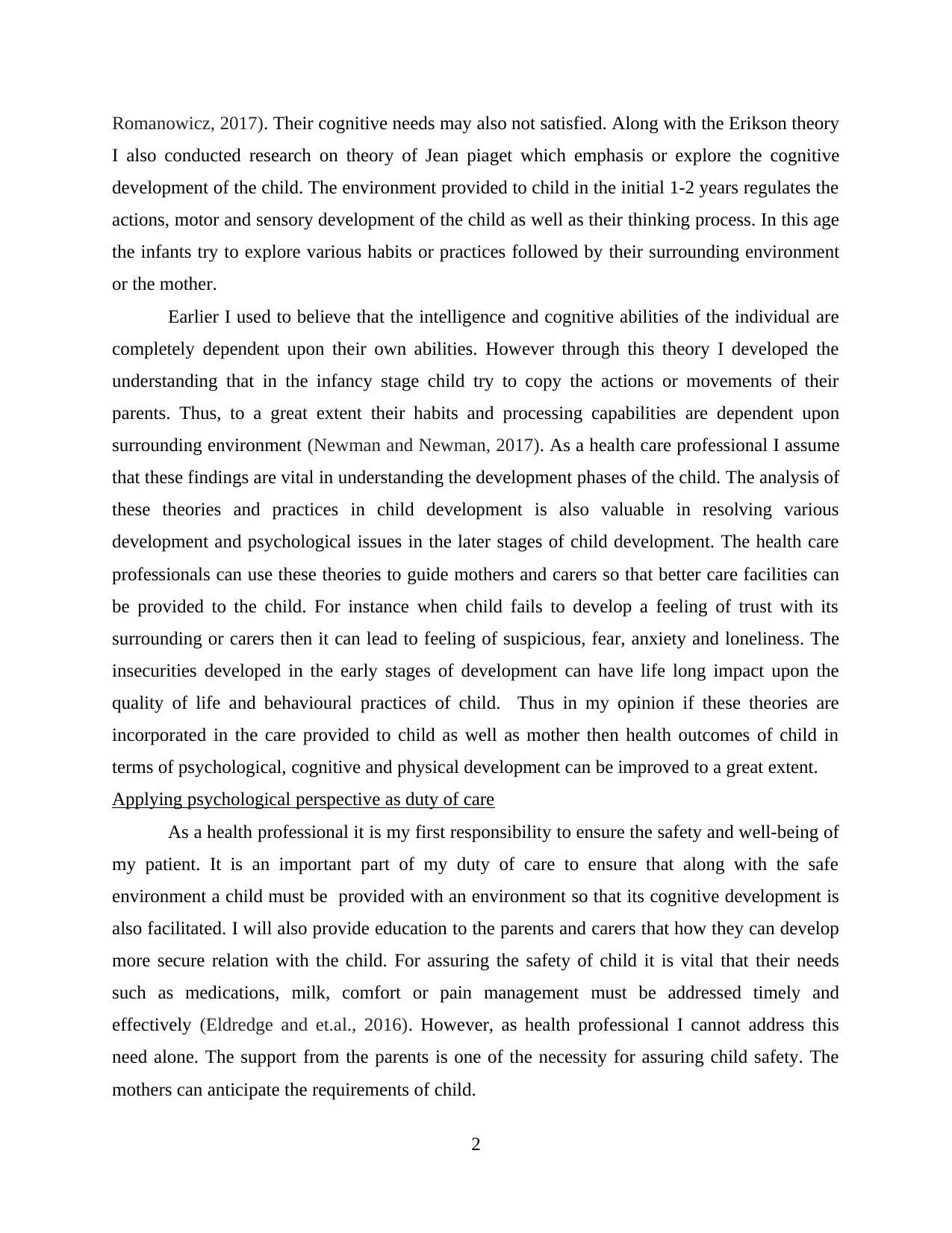
Romanowicz, 2017). Their cognitive needs may also not satisfied. Along with the Erikson theory
I also conducted research on theory of Jean piaget which emphasis or explore the cognitive
development of the child. The environment provided to child in the initial 1-2 years regulates the
actions, motor and sensory development of the child as well as their thinking process. In this age
the infants try to explore various habits or practices followed by their surrounding environment
or the mother.
Earlier I used to believe that the intelligence and cognitive abilities of the individual are
completely dependent upon their own abilities. However through this theory I developed the
understanding that in the infancy stage child try to copy the actions or movements of their
parents. Thus, to a great extent their habits and processing capabilities are dependent upon
surrounding environment (Newman and Newman, 2017). As a health care professional I assume
that these findings are vital in understanding the development phases of the child. The analysis of
these theories and practices in child development is also valuable in resolving various
development and psychological issues in the later stages of child development. The health care
professionals can use these theories to guide mothers and carers so that better care facilities can
be provided to the child. For instance when child fails to develop a feeling of trust with its
surrounding or carers then it can lead to feeling of suspicious, fear, anxiety and loneliness. The
insecurities developed in the early stages of development can have life long impact upon the
quality of life and behavioural practices of child. Thus in my opinion if these theories are
incorporated in the care provided to child as well as mother then health outcomes of child in
terms of psychological, cognitive and physical development can be improved to a great extent.
Applying psychological perspective as duty of care
As a health professional it is my first responsibility to ensure the safety and well-being of
my patient. It is an important part of my duty of care to ensure that along with the safe
environment a child must be provided with an environment so that its cognitive development is
also facilitated. I will also provide education to the parents and carers that how they can develop
more secure relation with the child. For assuring the safety of child it is vital that their needs
such as medications, milk, comfort or pain management must be addressed timely and
effectively (Eldredge and et.al., 2016). However, as health professional I cannot address this
need alone. The support from the parents is one of the necessity for assuring child safety. The
mothers can anticipate the requirements of child.
2
I also conducted research on theory of Jean piaget which emphasis or explore the cognitive
development of the child. The environment provided to child in the initial 1-2 years regulates the
actions, motor and sensory development of the child as well as their thinking process. In this age
the infants try to explore various habits or practices followed by their surrounding environment
or the mother.
Earlier I used to believe that the intelligence and cognitive abilities of the individual are
completely dependent upon their own abilities. However through this theory I developed the
understanding that in the infancy stage child try to copy the actions or movements of their
parents. Thus, to a great extent their habits and processing capabilities are dependent upon
surrounding environment (Newman and Newman, 2017). As a health care professional I assume
that these findings are vital in understanding the development phases of the child. The analysis of
these theories and practices in child development is also valuable in resolving various
development and psychological issues in the later stages of child development. The health care
professionals can use these theories to guide mothers and carers so that better care facilities can
be provided to the child. For instance when child fails to develop a feeling of trust with its
surrounding or carers then it can lead to feeling of suspicious, fear, anxiety and loneliness. The
insecurities developed in the early stages of development can have life long impact upon the
quality of life and behavioural practices of child. Thus in my opinion if these theories are
incorporated in the care provided to child as well as mother then health outcomes of child in
terms of psychological, cognitive and physical development can be improved to a great extent.
Applying psychological perspective as duty of care
As a health professional it is my first responsibility to ensure the safety and well-being of
my patient. It is an important part of my duty of care to ensure that along with the safe
environment a child must be provided with an environment so that its cognitive development is
also facilitated. I will also provide education to the parents and carers that how they can develop
more secure relation with the child. For assuring the safety of child it is vital that their needs
such as medications, milk, comfort or pain management must be addressed timely and
effectively (Eldredge and et.al., 2016). However, as health professional I cannot address this
need alone. The support from the parents is one of the necessity for assuring child safety. The
mothers can anticipate the requirements of child.
2
Paraphrase This Document
Need a fresh take? Get an instant paraphrase of this document with our AI Paraphraser
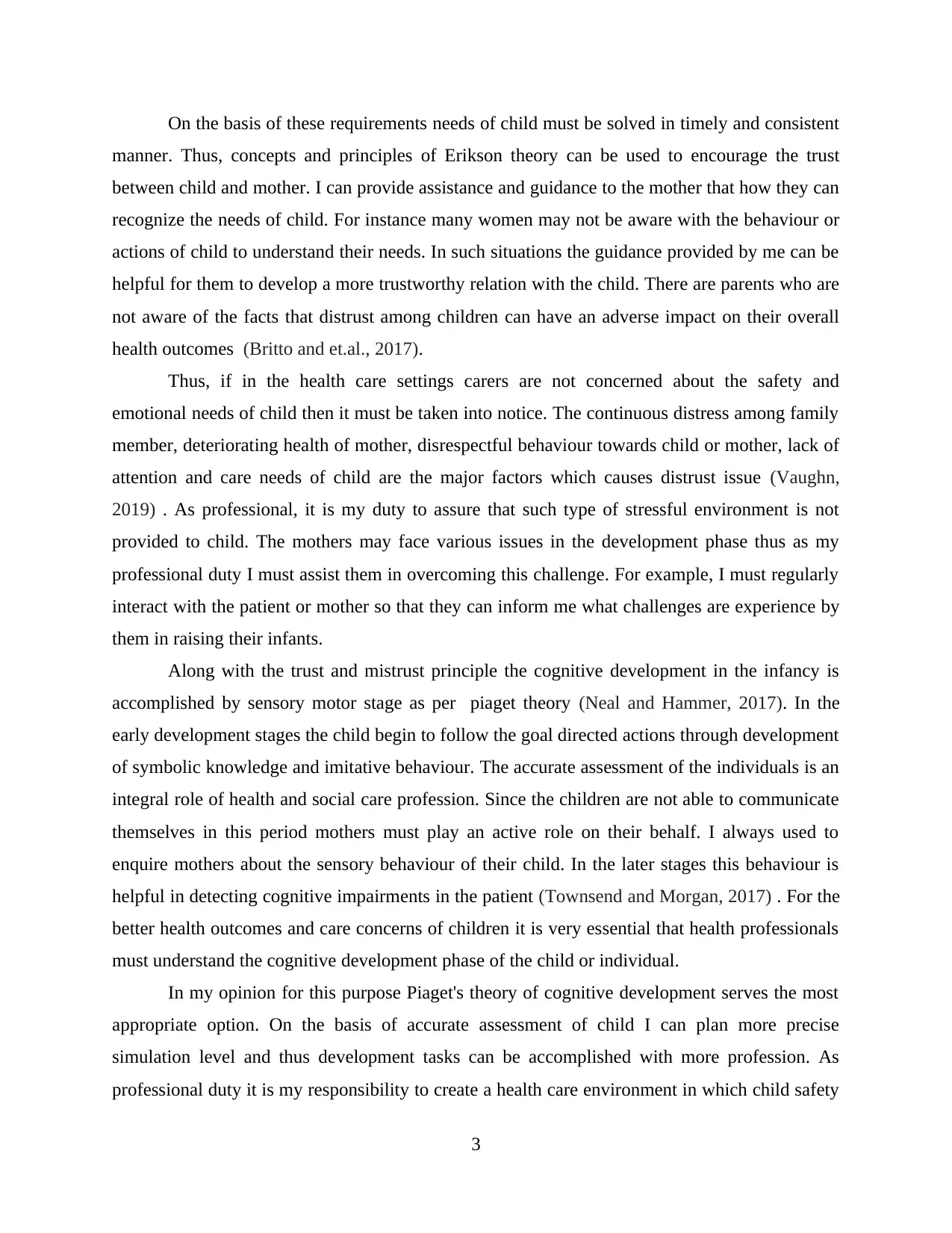
On the basis of these requirements needs of child must be solved in timely and consistent
manner. Thus, concepts and principles of Erikson theory can be used to encourage the trust
between child and mother. I can provide assistance and guidance to the mother that how they can
recognize the needs of child. For instance many women may not be aware with the behaviour or
actions of child to understand their needs. In such situations the guidance provided by me can be
helpful for them to develop a more trustworthy relation with the child. There are parents who are
not aware of the facts that distrust among children can have an adverse impact on their overall
health outcomes (Britto and et.al., 2017).
Thus, if in the health care settings carers are not concerned about the safety and
emotional needs of child then it must be taken into notice. The continuous distress among family
member, deteriorating health of mother, disrespectful behaviour towards child or mother, lack of
attention and care needs of child are the major factors which causes distrust issue (Vaughn,
2019) . As professional, it is my duty to assure that such type of stressful environment is not
provided to child. The mothers may face various issues in the development phase thus as my
professional duty I must assist them in overcoming this challenge. For example, I must regularly
interact with the patient or mother so that they can inform me what challenges are experience by
them in raising their infants.
Along with the trust and mistrust principle the cognitive development in the infancy is
accomplished by sensory motor stage as per piaget theory (Neal and Hammer, 2017). In the
early development stages the child begin to follow the goal directed actions through development
of symbolic knowledge and imitative behaviour. The accurate assessment of the individuals is an
integral role of health and social care profession. Since the children are not able to communicate
themselves in this period mothers must play an active role on their behalf. I always used to
enquire mothers about the sensory behaviour of their child. In the later stages this behaviour is
helpful in detecting cognitive impairments in the patient (Townsend and Morgan, 2017) . For the
better health outcomes and care concerns of children it is very essential that health professionals
must understand the cognitive development phase of the child or individual.
In my opinion for this purpose Piaget's theory of cognitive development serves the most
appropriate option. On the basis of accurate assessment of child I can plan more precise
simulation level and thus development tasks can be accomplished with more profession. As
professional duty it is my responsibility to create a health care environment in which child safety
3
manner. Thus, concepts and principles of Erikson theory can be used to encourage the trust
between child and mother. I can provide assistance and guidance to the mother that how they can
recognize the needs of child. For instance many women may not be aware with the behaviour or
actions of child to understand their needs. In such situations the guidance provided by me can be
helpful for them to develop a more trustworthy relation with the child. There are parents who are
not aware of the facts that distrust among children can have an adverse impact on their overall
health outcomes (Britto and et.al., 2017).
Thus, if in the health care settings carers are not concerned about the safety and
emotional needs of child then it must be taken into notice. The continuous distress among family
member, deteriorating health of mother, disrespectful behaviour towards child or mother, lack of
attention and care needs of child are the major factors which causes distrust issue (Vaughn,
2019) . As professional, it is my duty to assure that such type of stressful environment is not
provided to child. The mothers may face various issues in the development phase thus as my
professional duty I must assist them in overcoming this challenge. For example, I must regularly
interact with the patient or mother so that they can inform me what challenges are experience by
them in raising their infants.
Along with the trust and mistrust principle the cognitive development in the infancy is
accomplished by sensory motor stage as per piaget theory (Neal and Hammer, 2017). In the
early development stages the child begin to follow the goal directed actions through development
of symbolic knowledge and imitative behaviour. The accurate assessment of the individuals is an
integral role of health and social care profession. Since the children are not able to communicate
themselves in this period mothers must play an active role on their behalf. I always used to
enquire mothers about the sensory behaviour of their child. In the later stages this behaviour is
helpful in detecting cognitive impairments in the patient (Townsend and Morgan, 2017) . For the
better health outcomes and care concerns of children it is very essential that health professionals
must understand the cognitive development phase of the child or individual.
In my opinion for this purpose Piaget's theory of cognitive development serves the most
appropriate option. On the basis of accurate assessment of child I can plan more precise
simulation level and thus development tasks can be accomplished with more profession. As
professional duty it is my responsibility to create a health care environment in which child safety
3
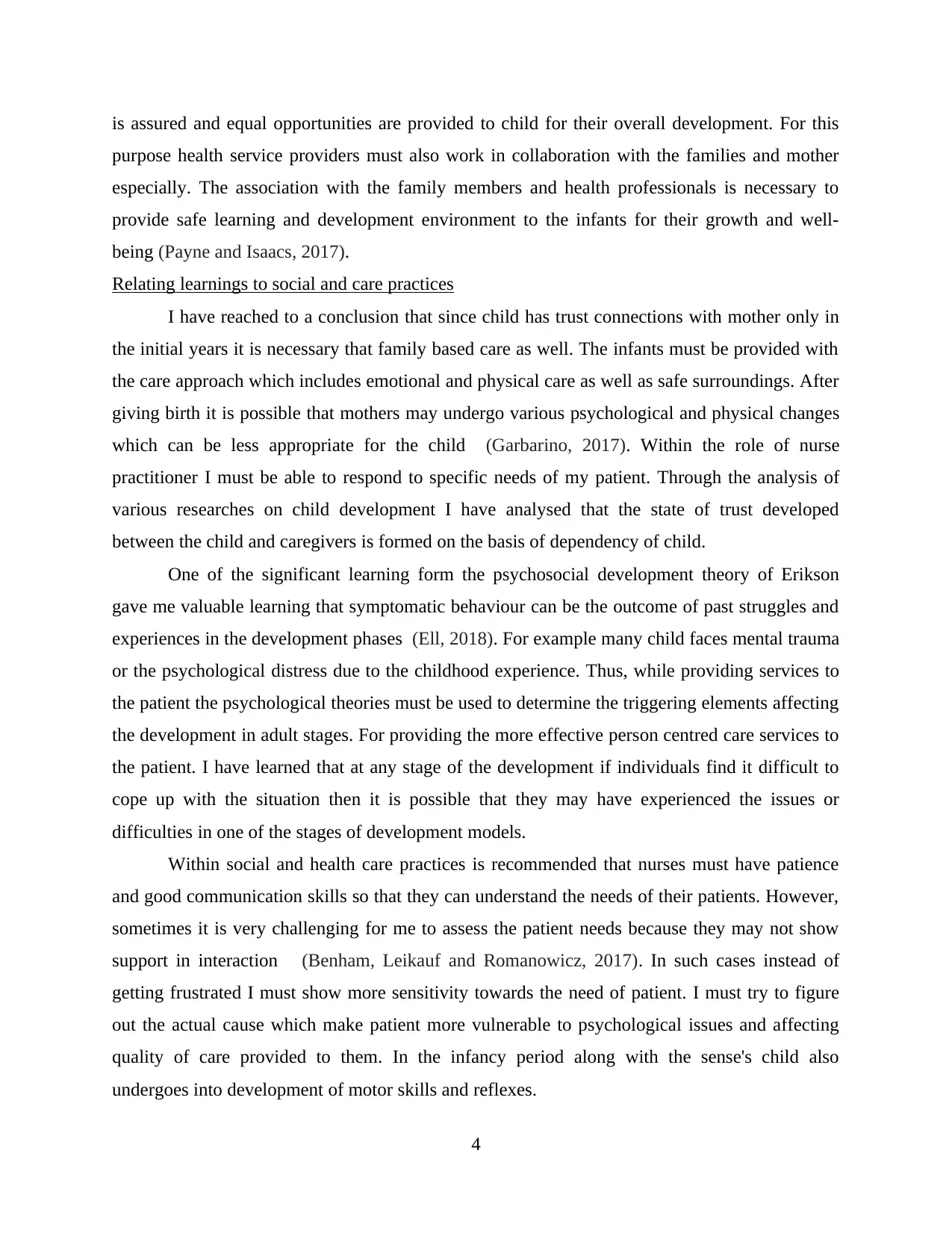
is assured and equal opportunities are provided to child for their overall development. For this
purpose health service providers must also work in collaboration with the families and mother
especially. The association with the family members and health professionals is necessary to
provide safe learning and development environment to the infants for their growth and well-
being (Payne and Isaacs, 2017).
Relating learnings to social and care practices
I have reached to a conclusion that since child has trust connections with mother only in
the initial years it is necessary that family based care as well. The infants must be provided with
the care approach which includes emotional and physical care as well as safe surroundings. After
giving birth it is possible that mothers may undergo various psychological and physical changes
which can be less appropriate for the child (Garbarino, 2017). Within the role of nurse
practitioner I must be able to respond to specific needs of my patient. Through the analysis of
various researches on child development I have analysed that the state of trust developed
between the child and caregivers is formed on the basis of dependency of child.
One of the significant learning form the psychosocial development theory of Erikson
gave me valuable learning that symptomatic behaviour can be the outcome of past struggles and
experiences in the development phases (Ell, 2018). For example many child faces mental trauma
or the psychological distress due to the childhood experience. Thus, while providing services to
the patient the psychological theories must be used to determine the triggering elements affecting
the development in adult stages. For providing the more effective person centred care services to
the patient. I have learned that at any stage of the development if individuals find it difficult to
cope up with the situation then it is possible that they may have experienced the issues or
difficulties in one of the stages of development models.
Within social and health care practices is recommended that nurses must have patience
and good communication skills so that they can understand the needs of their patients. However,
sometimes it is very challenging for me to assess the patient needs because they may not show
support in interaction (Benham, Leikauf and Romanowicz, 2017). In such cases instead of
getting frustrated I must show more sensitivity towards the need of patient. I must try to figure
out the actual cause which make patient more vulnerable to psychological issues and affecting
quality of care provided to them. In the infancy period along with the sense's child also
undergoes into development of motor skills and reflexes.
4
purpose health service providers must also work in collaboration with the families and mother
especially. The association with the family members and health professionals is necessary to
provide safe learning and development environment to the infants for their growth and well-
being (Payne and Isaacs, 2017).
Relating learnings to social and care practices
I have reached to a conclusion that since child has trust connections with mother only in
the initial years it is necessary that family based care as well. The infants must be provided with
the care approach which includes emotional and physical care as well as safe surroundings. After
giving birth it is possible that mothers may undergo various psychological and physical changes
which can be less appropriate for the child (Garbarino, 2017). Within the role of nurse
practitioner I must be able to respond to specific needs of my patient. Through the analysis of
various researches on child development I have analysed that the state of trust developed
between the child and caregivers is formed on the basis of dependency of child.
One of the significant learning form the psychosocial development theory of Erikson
gave me valuable learning that symptomatic behaviour can be the outcome of past struggles and
experiences in the development phases (Ell, 2018). For example many child faces mental trauma
or the psychological distress due to the childhood experience. Thus, while providing services to
the patient the psychological theories must be used to determine the triggering elements affecting
the development in adult stages. For providing the more effective person centred care services to
the patient. I have learned that at any stage of the development if individuals find it difficult to
cope up with the situation then it is possible that they may have experienced the issues or
difficulties in one of the stages of development models.
Within social and health care practices is recommended that nurses must have patience
and good communication skills so that they can understand the needs of their patients. However,
sometimes it is very challenging for me to assess the patient needs because they may not show
support in interaction (Benham, Leikauf and Romanowicz, 2017). In such cases instead of
getting frustrated I must show more sensitivity towards the need of patient. I must try to figure
out the actual cause which make patient more vulnerable to psychological issues and affecting
quality of care provided to them. In the infancy period along with the sense's child also
undergoes into development of motor skills and reflexes.
4
⊘ This is a preview!⊘
Do you want full access?
Subscribe today to unlock all pages.

Trusted by 1+ million students worldwide
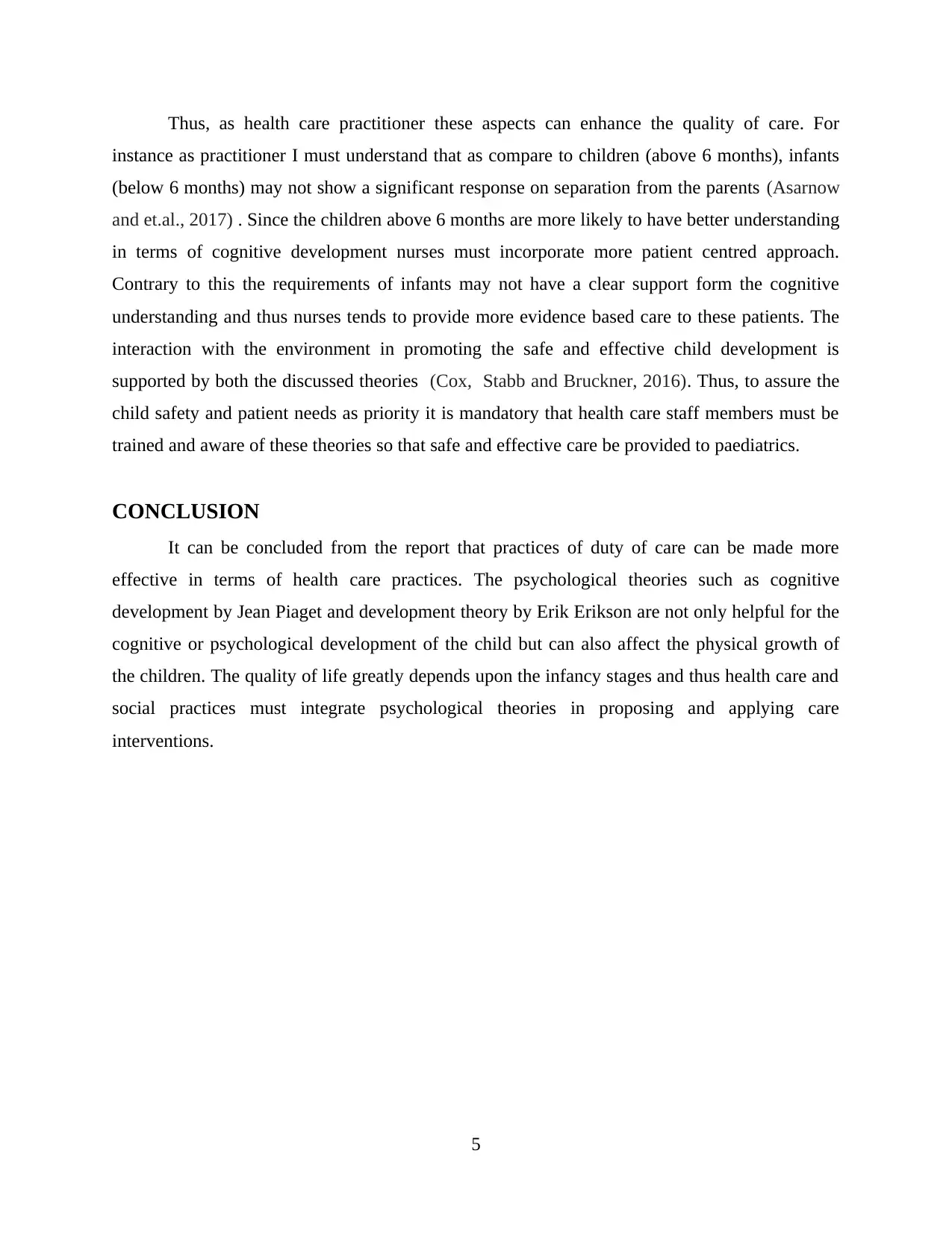
Thus, as health care practitioner these aspects can enhance the quality of care. For
instance as practitioner I must understand that as compare to children (above 6 months), infants
(below 6 months) may not show a significant response on separation from the parents (Asarnow
and et.al., 2017) . Since the children above 6 months are more likely to have better understanding
in terms of cognitive development nurses must incorporate more patient centred approach.
Contrary to this the requirements of infants may not have a clear support form the cognitive
understanding and thus nurses tends to provide more evidence based care to these patients. The
interaction with the environment in promoting the safe and effective child development is
supported by both the discussed theories (Cox, Stabb and Bruckner, 2016). Thus, to assure the
child safety and patient needs as priority it is mandatory that health care staff members must be
trained and aware of these theories so that safe and effective care be provided to paediatrics.
CONCLUSION
It can be concluded from the report that practices of duty of care can be made more
effective in terms of health care practices. The psychological theories such as cognitive
development by Jean Piaget and development theory by Erik Erikson are not only helpful for the
cognitive or psychological development of the child but can also affect the physical growth of
the children. The quality of life greatly depends upon the infancy stages and thus health care and
social practices must integrate psychological theories in proposing and applying care
interventions.
5
instance as practitioner I must understand that as compare to children (above 6 months), infants
(below 6 months) may not show a significant response on separation from the parents (Asarnow
and et.al., 2017) . Since the children above 6 months are more likely to have better understanding
in terms of cognitive development nurses must incorporate more patient centred approach.
Contrary to this the requirements of infants may not have a clear support form the cognitive
understanding and thus nurses tends to provide more evidence based care to these patients. The
interaction with the environment in promoting the safe and effective child development is
supported by both the discussed theories (Cox, Stabb and Bruckner, 2016). Thus, to assure the
child safety and patient needs as priority it is mandatory that health care staff members must be
trained and aware of these theories so that safe and effective care be provided to paediatrics.
CONCLUSION
It can be concluded from the report that practices of duty of care can be made more
effective in terms of health care practices. The psychological theories such as cognitive
development by Jean Piaget and development theory by Erik Erikson are not only helpful for the
cognitive or psychological development of the child but can also affect the physical growth of
the children. The quality of life greatly depends upon the infancy stages and thus health care and
social practices must integrate psychological theories in proposing and applying care
interventions.
5
Paraphrase This Document
Need a fresh take? Get an instant paraphrase of this document with our AI Paraphraser
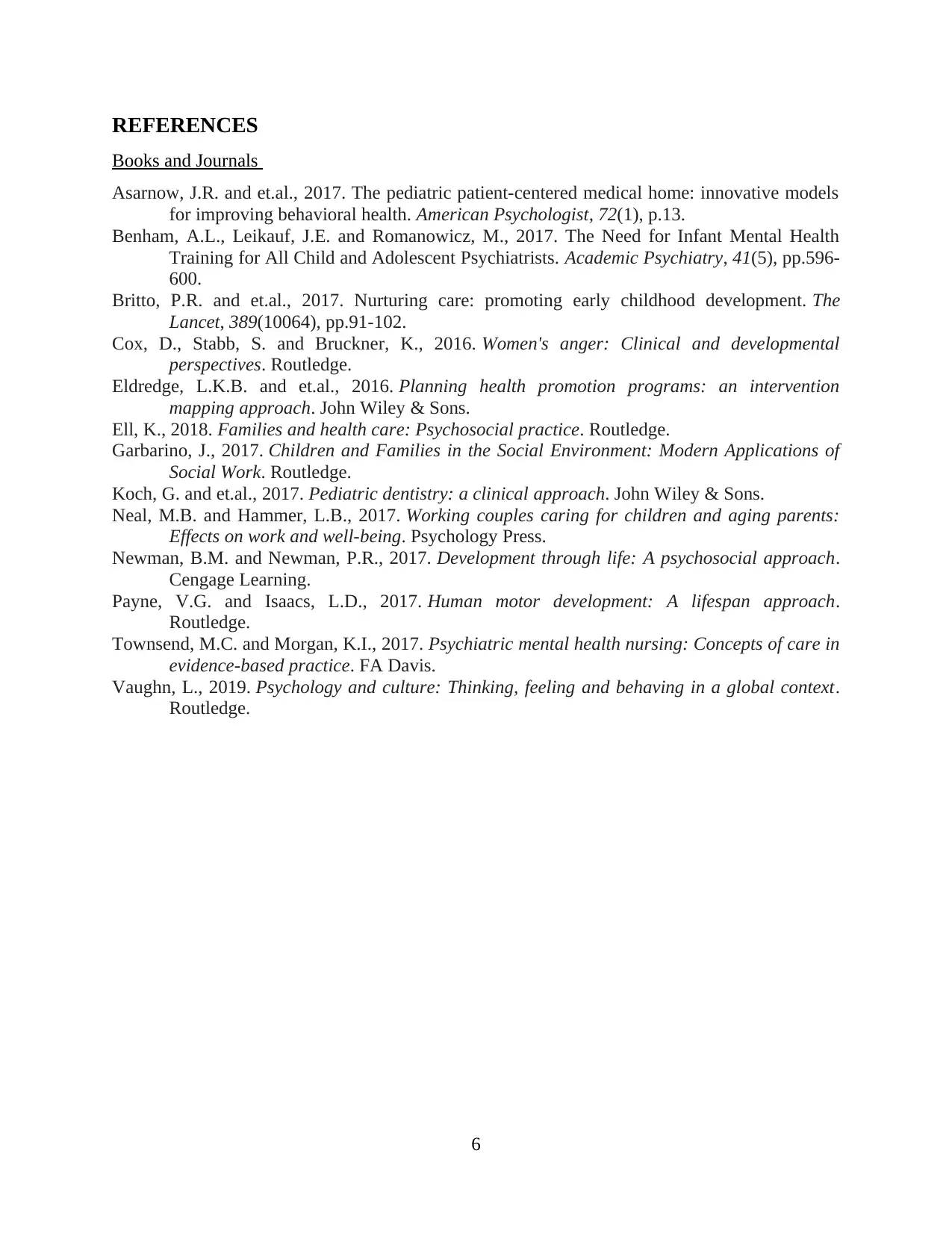
REFERENCES
Books and Journals
Asarnow, J.R. and et.al., 2017. The pediatric patient-centered medical home: innovative models
for improving behavioral health. American Psychologist, 72(1), p.13.
Benham, A.L., Leikauf, J.E. and Romanowicz, M., 2017. The Need for Infant Mental Health
Training for All Child and Adolescent Psychiatrists. Academic Psychiatry, 41(5), pp.596-
600.
Britto, P.R. and et.al., 2017. Nurturing care: promoting early childhood development. The
Lancet, 389(10064), pp.91-102.
Cox, D., Stabb, S. and Bruckner, K., 2016. Women's anger: Clinical and developmental
perspectives. Routledge.
Eldredge, L.K.B. and et.al., 2016. Planning health promotion programs: an intervention
mapping approach. John Wiley & Sons.
Ell, K., 2018. Families and health care: Psychosocial practice. Routledge.
Garbarino, J., 2017. Children and Families in the Social Environment: Modern Applications of
Social Work. Routledge.
Koch, G. and et.al., 2017. Pediatric dentistry: a clinical approach. John Wiley & Sons.
Neal, M.B. and Hammer, L.B., 2017. Working couples caring for children and aging parents:
Effects on work and well-being. Psychology Press.
Newman, B.M. and Newman, P.R., 2017. Development through life: A psychosocial approach.
Cengage Learning.
Payne, V.G. and Isaacs, L.D., 2017. Human motor development: A lifespan approach.
Routledge.
Townsend, M.C. and Morgan, K.I., 2017. Psychiatric mental health nursing: Concepts of care in
evidence-based practice. FA Davis.
Vaughn, L., 2019. Psychology and culture: Thinking, feeling and behaving in a global context.
Routledge.
6
Books and Journals
Asarnow, J.R. and et.al., 2017. The pediatric patient-centered medical home: innovative models
for improving behavioral health. American Psychologist, 72(1), p.13.
Benham, A.L., Leikauf, J.E. and Romanowicz, M., 2017. The Need for Infant Mental Health
Training for All Child and Adolescent Psychiatrists. Academic Psychiatry, 41(5), pp.596-
600.
Britto, P.R. and et.al., 2017. Nurturing care: promoting early childhood development. The
Lancet, 389(10064), pp.91-102.
Cox, D., Stabb, S. and Bruckner, K., 2016. Women's anger: Clinical and developmental
perspectives. Routledge.
Eldredge, L.K.B. and et.al., 2016. Planning health promotion programs: an intervention
mapping approach. John Wiley & Sons.
Ell, K., 2018. Families and health care: Psychosocial practice. Routledge.
Garbarino, J., 2017. Children and Families in the Social Environment: Modern Applications of
Social Work. Routledge.
Koch, G. and et.al., 2017. Pediatric dentistry: a clinical approach. John Wiley & Sons.
Neal, M.B. and Hammer, L.B., 2017. Working couples caring for children and aging parents:
Effects on work and well-being. Psychology Press.
Newman, B.M. and Newman, P.R., 2017. Development through life: A psychosocial approach.
Cengage Learning.
Payne, V.G. and Isaacs, L.D., 2017. Human motor development: A lifespan approach.
Routledge.
Townsend, M.C. and Morgan, K.I., 2017. Psychiatric mental health nursing: Concepts of care in
evidence-based practice. FA Davis.
Vaughn, L., 2019. Psychology and culture: Thinking, feeling and behaving in a global context.
Routledge.
6

7
⊘ This is a preview!⊘
Do you want full access?
Subscribe today to unlock all pages.

Trusted by 1+ million students worldwide

8
Paraphrase This Document
Need a fresh take? Get an instant paraphrase of this document with our AI Paraphraser

9

10
⊘ This is a preview!⊘
Do you want full access?
Subscribe today to unlock all pages.

Trusted by 1+ million students worldwide
1 out of 13
Related Documents
Your All-in-One AI-Powered Toolkit for Academic Success.
+13062052269
info@desklib.com
Available 24*7 on WhatsApp / Email
![[object Object]](/_next/static/media/star-bottom.7253800d.svg)
Unlock your academic potential
Copyright © 2020–2026 A2Z Services. All Rights Reserved. Developed and managed by ZUCOL.





